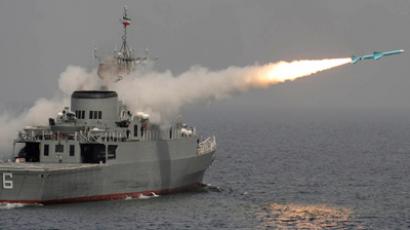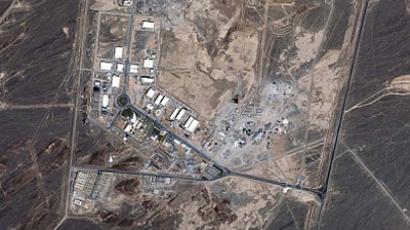'Standard' duty? More US battle ships head to Persian Gulf
The US is deploying more warships to the Persian Gulf area, with the aircraft carrier USS Carl Vinson entering the Arabian Sea. Washington is also winning over Japan and India in the oil sanction war against Iran.
The Pentagon denies the USS Carl Vinson has been dispatched to the Gulf region over the Strait of Hormuz tensions. “Her deployment in that area is routine, long-planned – there’s nothing unusual about that,” said Pentagon spokesman John Kirby.The Carl Vinson, carrying up to 80 planes and helicopters on board and backed by a cruiser, destroyer, has not gone the through of Strait of Hormuz, a major oil lane, which Iran is threatening to block if the West imposes sanctions on its crude exports. According to the American broadcaster Fox News, the group is now in the Arabian Sea. The Pentagon says the warships have arrived “not in the Gulf,” but in the area in the US Fifth Fleet’s responsibility. That, apart from the Persian Gulf and the Gulf of Oman, includes the Red Sea and some parts of the Indian Ocean. Though now Washington says the USS John C. Stennis, which crossed the Strait of Hormuz on December 29, is not expected to return to the Gulf, the US Navy confirms another aircraft carrier is to join the Carl Vinson. This is the USS Abraham Lincoln, currently in the Indian Ocean and en route to the strike group.The UK has also commissioned one of its newest warships to the Gulf waters. Royal Navy's Type 45 destroyer HMS Daring set out for its "routine" mission to replace a frigate on station previous week. The UK joined the US in a pledge not to allow Iran to block traffic in the Strait of Hormuz, which connects the Persian Gulf with the Gulf of Oman. Tehran’s harsh rhetoric was provoked by the prospect of an international embargo on its oil based on allegations that Iran plans to build nuclear weapons.
More members in ‘Sanction Iran’ club
Coupled with warship maneuvering, Washington’s is also sharpening its axe for Iran’s economy. US diplomats have set out on a war path to talk other countries into punishing Iran for a prospect its nuclear program might deviate from the civil route. On Thursday, Washington won over Japan, a major importer of Iranian crude, to impose tough oil sanctions against Tehran. Japan, according to Finance Minister Jun Azumi, imports about 10 per cent of its oil necessities from Iran.“We plan to start reducing this 10 per cent share as soon as possible in a planned manner,” said Azumi.In India, the government is also not seeking “to waver” from the American steer, reports Reuters, quoting their sources in the cabinet. India, which spends $12 billion on Iranian oil per year, is Tehran's largest oil buyer after the biggest customer, China. China on Wednesday reacted coolly to the US efforts. Beijing slammed US sanctions on financial institutions dealing with the Iranian Central Bank, which President Barack Obama approved on New Year’s Eve. “To place one country’s domestic law above international law and press others to obey is not reasonable,” said Chinese Foreign Ministry spokesman Liu Weimin.China, consuming up to 30 percent of Iran’s crude daily exports, comes up as a key player in the sanctions game. Meanwhile, in the Strait of Hormuz build-up, the Arab Emirate of Abu Dhabi has sped up the construction of a pipeline bypassing this bottleneck. The trial of the Fujairah pipeline has been moved to May, reports the Emirates 24/7 news website. The Fujairah is set to transport 1.4 million barrels per day (mbpd). Tankers currently take up to 17 mbpd through the strait.
Hormuz Straitjacket: US-Iranian standoff
It does not appease Washington that the international nuclear watchdog is on site closely monitoring Iran’s nuclear activities.“Are they trying to develop a nuclear weapon? No. But we know that they're trying to develop a nuclear capability. And that's what concerns us. And our red line to Iran is ‘Do not develop a nuclear weapon,’” said US Secretary of Defense Leon Panetta.Iran’s main source of livelihood – its oil export – is in danger. The US is imposing fresh sanctions that will dramatically complicate transactions through Iran’s Central Bank. Iran is also close to losing Europe as a customer. Cornered by crippling sanctions, Iran threatened to block the Strait of Hormuz – a vital oil artery through which one sixth of the world's oil is shipped. The US has replied by moving its Fifth Fleet to the region, saying if Iran goes for it, they will attack.Experts say the policy of isolating Iran may lead to other threats from Tehran and a possibility that one day they will go through with their threats. Washington signals that it is ready, or at least it wants everybody to believe that it is ready.Some believe it is just a war of words, and neither side will go for an all-out conflict, considering what a disaster it would be for the whole region. It may be a war of words, but actions are already showing.Thousands of US troops are being deployed to Israel. An American citizen in Iran has been sentenced to death, convicted of espionage.A look back in history – the assassination of Archduke Franz Ferdinand of Austria, the heir presumptive to the Austro-Hungarian throne, in 1914 set in motion a series of events that led to World War One and then, World War Two. With regards to Iran today, the possible blocking of the Strait of Hormuz could become that trigger. Or it could be the killing of the American citizen. Iran might feel cornered, and therefore make drastic moves. Right now it is a war of words. But one bullet fired and the powder keg could blow up. The question is: what is going to provide that deadly spark?














